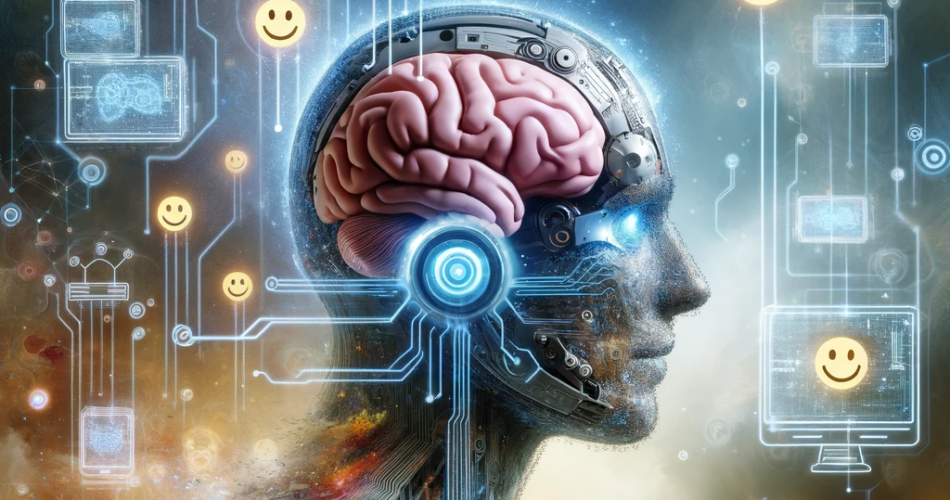Introduction: At the Crossroads of Emotion and Technology
What if the key to happiness was not in experiences or relationships, but within a tiny implant in your brain? The idea, once a mere flight of fancy, is now on the horizon of becoming a reality. Tracing our journey from Hippocrates’ natural remedies to cutting-edge neural implants, we explore how humanity’s age-old quest for happiness is converging with modern technology.
Hippocrates and the Natural Path to Well-Being
The Foundation of Holistic Medicine
Our quest begins with Hippocrates, the revered Greek physician, who emphasized treating ailments with natural remedies. Among these was valerian, used for its calming effects since ancient times. This marked the beginning of humanity’s search for mental well-being through natural means.
Valerian Through the Ages
Valerian’s journey through history – from ancient Greece and Rome to its use during World War II as a stress reliever – symbolizes our enduring quest to find natural solutions to emotional turmoil.
The Intersection of Science Fiction and Reality
Jules Verne: Inspiring a Generation
Moving forward to the 19th century, Jules Verne’s science fiction novel “From the Earth to the Moon” did more than entertain; it inspired a generation. His imaginative tale about space travel sparked real scientific inquiries into rocketry and space exploration.
Hermann Oberth and the Dawn of Rocketry
Inspired by Verne, Hermann Oberth, dubbed the German father of rocketry, laid the mathematical groundwork for modern space travel. His research and innovations were a significant leap in turning what was once science fiction into reality.
The Darker Side of Technological Advances
Wernher von Braun: From V2 Rockets to NASA
Oberth’s mentee, Wernher von Braun, played a crucial role in developing the infamous V2 rocket during World War II. Although von Braun later contributed significantly to NASA’s space program, his involvement with the Nazi regime reflects the complex and often troubling ethical implications of technological advances.
From Warfare to Healthcare: The Unexpected Turn
Hydrazine: A Catalyst for Change
Post World War II, the surplus of hydrazine, initially used in warfare, found surprising applications in various industries, from the production of spandex to car airbags. This highlights the unpredictable trajectory of scientific discoveries.
The Serendipitous Discovery of Antidepressants
The real twist came when hydrazine derivatives were found effective in treating tuberculosis. Unexpectedly, these compounds also improved patients’ mood, leading to the accidental discovery of the world’s first successful antidepressant, Iproniazid.
The Modern Quest for Emotional Control
Sarah’s Story: A Glimpse into the Future
Fast forward to the 21st century, where we meet Sarah, a woman suffering from severe depression. After a series of unsuccessful treatments, she participates in an experimental therapy involving a neural implant that controls her emotions, marking a significant milestone in our quest for happiness.
The Promise of Neural Implants
This groundbreaking treatment, led by Dr. Edward Chang, demonstrates the potential of direct brain intervention in managing mental health. The implant, which modulates specific brain circuits, offers a new frontier in emotional regulation.
The Ethical Dilemma: Happiness at a Switch
The Implications of Artificial Happiness
The prospect of a brain implant that can trigger happiness raises profound ethical and philosophical questions. Can true happiness be artificially generated? What are the implications of being able to control our emotions with the flick of a switch?
The Future of Emotional Well-Being
As we stand at the precipice of this technological breakthrough, we must carefully consider its impact on our understanding of human emotion, mental health, and the essence of our experiences.
Conclusion: Embracing the Unknown with Caution and Hope
In conclusion, the journey from Hippocrates’ natural remedies to the possibility of neural implants for emotional control represents humanity’s enduring pursuit of happiness. As we enter this new era of medical science, we must navigate the ethical complexities and philosophical questions it presents. Our quest for happiness, it seems, is leading us into uncharted territories of the human mind and soul.

